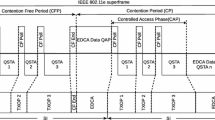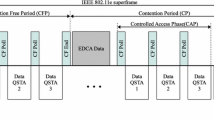Abstract
In the polling mode in IEEE 802.16d/e, one of three modes: unicast, multicast and broadcast pollings, is used to reserve bandwidth for data transmission. In the unicast polling, the BS polls each individual MS to allow to transmit a bandwidth request packet, while in the multicast and broadcast pollings, the truncated binary exponential backoff (TBEB) mechanism is adopted as a contention resolution among mobile stations (MSs) in a multicast or broadcast group. This paper investigates the delay of bandwidth requests in the unicast, multicast and broadcast pollings, by deriving the delay distribution of the unicast polling and the TBEB by means of analytical methods. We consider an error-free channel as well as an error-prone channel with i.i.d. constant packet error rate per frame. Furthermore, we find the utilization of transmission opportunity to see efficiency of the bandwidth in the TBEB. Performance evaluations are provided to show that analytical results are well-matched with simulations. By the numerical results, we can find the optimal parameters such as the initial backoff window size of the TBEB and the number of transmission opportunities (or slots) satisfying quality of service (QoS) requirement on delay and loss, and thus we can determine which scheme is better than others depending on the probability of a request arrival during one frame. Numerical examples address that the TBEB performs better than the unicast polling for light traffic loads and vice versa for heavy traffic loads. Also, it is shown that the multicast polling has better performance than the broadcast polling in the sense of shorter delay, lower loss probability and higher utilization of transmission opportunity.
Similar content being viewed by others
References
IEEE 802.16-2004. Part 16: Air interface for fixed broadband wireless access systems, standard for local and metropolitan area networks, October 2004.
IEEE 802.16e-2006. Part 16: Air interface for fixed and mobile broadband wireless access systems—amendment for physical and medium access control layers for combined fixed and mobile operation in licensed bands, February 2006.
Vinel, A., Zhang, Y., Lott, M., & Turlikov, A. (2005). Performance analysis of the random access in IEEE 802.16. In Proc. IEEE PIMRC 2005 (Vol. 3, pp. 1596–1600), Berlin, Germany, Sep. 2005.
Bianchi, G. (2000). Performance analysis of the IEEE 802.11 distributed coordination function. IEEE Journal on Selected Areas in Communications, 18(3), 535–548.
Vinel, A., Zhang, Y., Ni, Q., & Lyakhov, A. (2006). Efficient request mechanism usage in IEEE 802.16. In Proc. IEEE GLOBECOM 2006 (pp. 1–5), Nov. 2006.
Ni, Q., Vinel, A., Xiao, Y., Tuiliko, A., & Jiang, T. (2007). Investigation of bandwidth request mechanisms under point-to-multipoint mode of WiMAX networks. IEEE Communication Magazine, 45(5), 132–138.
Lin, L., Jia, W., & Lu, W. (2007). Performance analysis of IEEE 802.16 multicast and broadcast polling based bandwidth request. In Proc. IEEE WCNC 2007 (pp. 1854–1859), March 2007.
He, J., Guild, K., Yang, K., & Chen, H. H. (2007). Modeling contention based bandwidth request scheme for IEEE 802.16 networks. IEEE Communication Letters, 11(8), 698–700.
He, J., Tang, Z., & Chen, H. H. (2008). Performance comparison of OFDM bandwidth request schemes in fixed IEEE 802.16 networks. IEEE Communication Letters, 12(4), 283–285.
Chang, B., & Chou, C. (2006). Adaptive polling algorithm for reducing polling delay and increasing utilization for high density subscribers in WiMAX wireless networks. In Proc. IEEE ICCS 2006 (pp. 1–5), Oct. 2006.
Chang, B., Chou, C., & Liang, Y. (2008). Markov chain analysis of uplink subframe in polling-based WiMAX networks. Computer Communications, 31, 2381–2390.
Chang, B., & Chou, C. (2008). Markov chain model for polling delay and throughput analysis of uplink subframe in WiMAX networks. In Proc. IEEE WCNC 2008 (pp. 1368–1373), March–April 2008.
Seo, J., Lee, H., & Cho, C. (2006). Queueing behavior of IEEE 802.16 random access protocol for sporadic data transmissions. In Proc. IEEE ICCCN 2006 (pp. 351–357), Oct. 2006.
Yin, F., & Pujolle, G. (2008). Performance optimization for delay-tolerant and contention-based application in IEEE 802.16 networks. EURASIP Journal of Wireless Communications and Networking, 2008, 1–14.
Vinel, A., Staehle, D., Pries, R., & Ni, Q. (2007). Performance analysis of the polling scheme in IEEE 802.16. In Proc. distributed computer and communication networks 2007 (pp. 54–67), Moscow, Russia, Sep. 2007.
Kim, S. J., Kim, W. J., & Suh, Y. J. (2007). An efficient bandwidth request mechanism for non-real-time services in IEEE 802.16 systems. In Proc. IEEE/CREATE-NET COMSWARE 2007 (pp. 1–9), Jan. 2007.
Park, E. C., Kim, H., Kim, J. Y., & Kim, H. S. (2008). Dynamic bandwidth request-allocation algorithm for real-time services in IEEE 802.16 broadband wireless access networks. In Proc. IEEE INFOCOM 2008 (pp. 1526–1534).
Kim, S., Lee, M., & Yeom, I. (2009). Impact of bandwidth request schemes for Best-Effort traffic in IEEE 802.16 networks. Computer Communications, 32, 235–245.
Delicado, J., Delicado, F. M., & Orozco-Barbosa, L. (2008). Study of the IEEE 802.16 contention-based request mechanism. Telecommunication Systems, 38, 19–27.
Chan, K., Zhou, Y., He, J., & Tang, Z. (2008). Service differentiation for the bandwidth request scheme in fixed IEEE 802.16 networks. In Proc. IEEE ICCSC 2008 (pp. 718–722), May 2008.
Kim, T. O., Kim, K. J., & Choi, B. D. (2008). Performance analysis of IEEE 802.11 DCF and IEEE 802.11e EDCA in non-saturation condition. IEICE Transactions, 91-B(4), 1122–1131.
Leon-Garcia, A. (2009). Probability, statistics, and random processes for electrical engineering (3rd ed.). New York: Prentice Hall.
Author information
Authors and Affiliations
Corresponding author
Rights and permissions
About this article
Cite this article
Hwang, E., Kim, K.J., Lyakhov, A. et al. Performance analysis of bandwidth requests under unicast, multicast and broadcast pollings in IEEE 802.16d/e. Telecommun Syst 50, 15–30 (2012). https://doi.org/10.1007/s11235-010-9386-z
Published:
Issue Date:
DOI: https://doi.org/10.1007/s11235-010-9386-z




